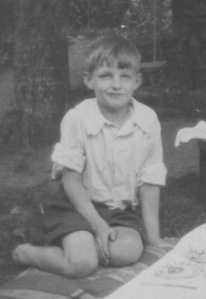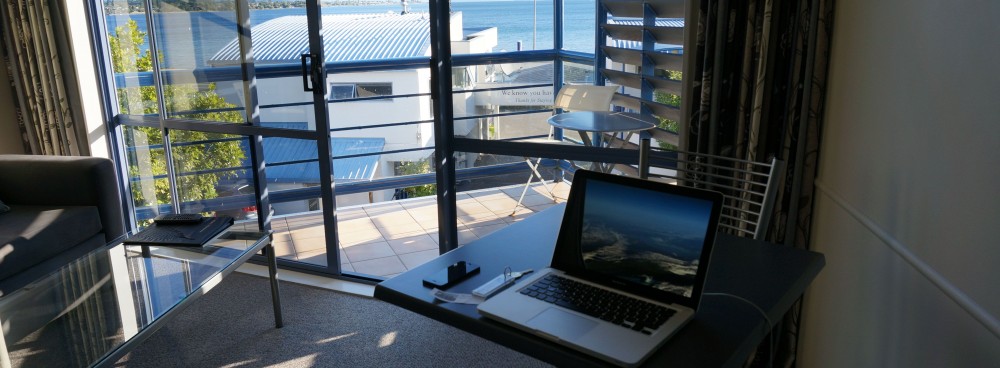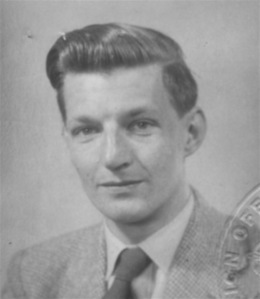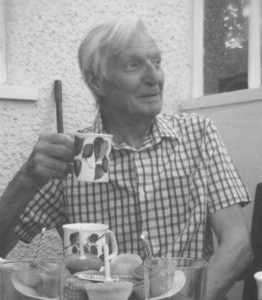
Tony was my dad. He died a month ago on 26th November 2015, aged 88. Suffice to say that in the immediate aftermath, there was a palpable sense among family and friends that someone real and gentle, clever and funny, compassionate and wise had gone. The facts of his life are relatively easy to relate but the whole feeling and the whole meaning of Tony in all our lives, those that knew him, will be harder to process and to understand; it will all take years. This post contains sections from his eulogy and some new thoughts but overall it’s just a start to the process of remembrance and understanding…
Tony was born in Ilford on the 26th July 1927, a younger brother for his much loved older sister Elizabeth who died in 2011. He was baptised with the first name “John”, following a longstanding family tradition. But, as was the way in a number of families at that time, he was better known by his middle name, Anthony, and always shortened to Tony.
Tony’s parents, Jack and Mildred, settled the family down in a flat in Sydenham Road near the centre of Croydon in the early 1930s. He went to school at St Mary’s Elementary and, later, Selhurst Grammar which is partly where he developed what would turn into a lifelong passion for both the arts and sciences in equal measure: chemistry and music, poetry and the visual arts. His knowledge was seemingly boundless on so many fronts. And he had a thirst for knowing more, judging partly from the range of books in his house and partly from memories of his approach to things he didn’t know: Look it up; research it; read about it. In later life, Google seemed to him like a minor miracle. He certainly gave the lie to the idea that there is a generation that don’t understand or use modern technology. In his late eighties, he was as comfortable wading through search engine returns as through books. Although like many of us, he never learned to manage junk mail properly.
Tony was aged 12 to 17 during the war years 1939 – 1945. These were important, formative times for him in his relationships, attitudes and values. He was evacuated to Brighton during the “phoney war” but returned home to Croydon just in time for the start of the heavy bombing raids which the town suffered throughout those years. The family spent a lot of time in the Anderson shelter down at the end of the garden and these experiences and wartime privations gave him – as with many of his generation – a set of values around not complaining, counting your blessings, making do, and staying completely calm and collected during difficult times. It also informed his horror and despair at war and violence in the world, especially civilian bombing from the air. He was an internationalist with a passion for peace and, whilst retaining his own Catholicism, he genuinely respected all religious beliefs and none.
Tony started work straight from school in 1943, aged 15, apprenticed to an accountancy firm. He hated it there and he soon began plotting a way out, following his love for science in evening study at Chelsea College, then part of the University of London; he later became a Fellow of the Royal Institute of Chemistry. He joined the laboratory of Dr Bernard Dyers and Company in 1953 and worked for them as a Public Analyst.
The 50s also found him seeing the sights of Europe, travelling there with his friends, including the Gryspeerdt brothers, Peter and (composer and musician) Michael from Sydenham Road. They went in “Laker” the car they named after Jim Laker, the Surrey and England cricketer, which would break down in the most spectacular locations (the Brenner Pass for example). The car was transported there on a plane from Lydd airport to Calais. At the time this was a hugely popular way of getting to France though it seems incredible to us now, driving a car on to a plane to get to the continent (https://en.wikipedia.org/wiki/Silver_City_Airways )
Tony was a staunch Catholic and it was somehow fitting that it was on a pilgrimage to Rome that he met his future wife, and our mother, Bernie, a beautiful young Irish woman. Family legend has it that he was hugely impressed after she produced a cigarette from a biscuit tin full of them after offering him one. They married in July 1960 and after a brief stay in Lewisham, settled in a house in Addiscombe, Croydon where my sister and I were born in the 60s. They remained together in that house until Bernie died in 1990.
Tony loved his job as an analytical chemist. In fact I don’t think I’ve ever met anyone as happy in their day job. Our childhood was full of scientific chat and related paraphernalia: starched white lab coats delivered to the front door for him every week, chromatography and copper sulphate crystal kits brought home and the rest. We visited his lab in the City of London, truly a place of wonder. He would have loved it if we’d become scientists too but in this, as in all things, he respected the choices we made: our jobs, our music and our own personal thinking on religion.
Alongside family life, music truly was the other great love of his life from his earliest years. He was an avid collector of records even when they took more than half his income, rushing home to spin discs with a running time of about 5 minutes which he bought from a place on the Strand. Classical music, especially English 20thc. composers were his first love, in particular, the music of Elgar and Delius.
My dad’s earliest media technology memories were of the wireless… He writes richly in an early musical autobiography of the media forms and popular culture of the time. The familiar running out of battery of our digitalia today having an echo in the late 30s in something that looks and reads like a blogpost:
“The source of most of our music at home was the wireless, run on accumulators which had to be taken along for recharging at the local tobacconists. What agony when the power would fade during a favourite programme such as Children’s Hour or a cinema organ recital…”
Later he connects music to other aspects of popular cultural life, Saturday mornings in front of the wireless:
“The memory … conjures up a vision of the lunch table, plums and custard finished and Father smoking his pipe, staring out of the window ruminating possibly on the chances of Crystal Palace later in the afternoon.”
Along with discussing film music and the last days of music hall an early encounter with an eerie form of world music came into through the wires of the little flat:
“Father was no mere random twiddler but assiduous student of “World Radio”, a weekly paper giving details of broadcasts from all over Europe and probably more distant parts too…From time to time we could hear Radio Algiers, but the transmissions seemed to consist of peculiar wailing noises, accompanied by a drum.”
And then a big change – as popular cultural artefacts entered the home with the purchase of a gramophone and they could decide their listening agenda (when they could afford it)
“Father’s pride and joy was his beautifully made HMV gramophone; a console model with doors opening to reveal the silk and fretwork clad loudspeaker. This was often played on Sunday morning on Father’s return from the 11 o’clock mass. The Chinese vase and runner would be removed, the motor carefully wound up, the doors opened and the massive pickup placed carefully on the record.”
Tony wrote later about the aftermath of a V1 flying bomb coming down in nearby St. James’s Road in the summer of 1944:
“When it was safe to emerge we found the front of the house windowless and saw the whole of the dining room window frame had been hurled across the room, crushing the table and landing within a yard of my pile of records – a near tragedy.”
I have strong memories of him following his musical obsessions through all the formats, from tape to cassette to CD but always, of course, vinyl albums. The first stereo tape recorder he ever bought gave him such pleasure. He bought so much music. In the 1960s and 70s, he used to borrow records from Croydon library in Mint Walk on a Saturday morning. I can remember watching him choose the records and take them over to the magnifiers to inspect them for damage. Scratches were reported on the ticket and people who scratched them badly had to replace them; the last thing you wanted to do was to get reported for scratches you didn’t make.
Later in life he became a singer, which gave him immense joy and pleasure. It all started with my sister Frances persuading him in 1977 to join the local church choir. He subsequently became a really confident bass, singing there until the traditional choir was abolished in 2004 and eventually joining the Latin choir at St Mary’s. At this point, he had already become a member of John Ruskin Choral Society (in 1983) and the Thursday Singers at Southwark Cathedral (in 1994). He was a much loved member of all of those choirs and made so many great friends, like Michael, Enid and Alan. Word got round and he would often take calls from local choirs who needed a bass at short notice. He knew so much music by heart, the Messiah and more, and he would often set off without a score to join in.
For years, Tony volunteered to do charity work for the blind, mainly due to the proximity in his early years of a blind couple downstairs from them in Sydenham Road. I remember, as a child, being lulled to sleep by the sound of him sitting downstairs recording books on economic and social theory for blind students. Right up until last year he produced an audio magazine podcast for the Croydon Vision charity for the blind, recording and engineering it himself painstakingly at home!
This post would go on too long to cover all of Tony’s many other passions and interests. I should mention his love of cricket, rugby, London, cats (even in his last days he was buying the cats presents!), his knowledge of, and love for, the languages French, Italian and German, good food, good wine and beer, travel, cinema, visual arts as well as his interest in the changing fortunes of Crystal Palace Football Club which he inherited from his own father who stood on the terraces in the thirties, forties and fifties. He was delighted at their form in recent years. The club announcer read his name out amongst the births, marriages and deaths at a recent game during half time. He would have got a tremendous kick out of that.
When he fell seriously ill this year, Tony was stoical, calm and centred. He was so grateful to the wonderful staff at both the Royal Marsden and to St Christopher’s Hospice and he was so proud of our NHS, having lived through the time before and after its founding. I can see him enjoying the thought of the NHS Choir at number one at Christmas this year, even though he may not have liked the song! His skilful and caring doctors and nurses found him to be as amazing as we did; one of them even stopped us to say she thought he was “inspirational” as he left the Marsden. We certainly found him to be so, and we also found his many carers during those weeks and months to be inspirational people too.
Tony was able right to the end to experience all the things he loved. We read poetry to him and more often than not he would join in from memory if we left a line out! We played him music he loved and my son’s girlfriend, who is a musician, recorded some piano music for him. Frances brought him some of his favourite food and she also located a little gin and tonic, which he loved. He was grateful for a visit by a priest in his last week and it gave him a deep sense of peace to receive the sacrament of the sick. This was, after all, his faith and we respected this part of his life even as we made different choices ourselves.
Tony was able to spend precious time with each of his grandchildren, as well as his son-in-law and daughter-in-law. My sister and I were there too for this time and sometimes we would catch each other’s eye and know that we were thinking the same thing: How lucky we were to have had this time with him; how lucky we were to have him as a father; and how lucky we were to share such a large part of our lives with such a remarkable person. Now we have to get used to being in the world without him.



Thanks for sharing this John. You did a great eulogy. Just a couple more things I would add. He had a great love of film and introduced us to all that at a very young age we had all watched the Truffaut films and other challenging ones that became favourites such as My Life as a Dog and Harold and Maud. Every time we came down from Sheffield he would produce another old gem on DVD that we hadn’t seen before. He also had a very very silly sense of humour. Starting with puns which he would always apologise for, a passion for Monsieur Hulot and a dry self deprecating wit which allowed him to see the funny side of many situations. We will miss that very much.
You’re absolutely right and thanks for jogging yet more great memories! x
That’s a beautiful obituary. How lucky you are to have had such a great dad!
Cary xx
Thanks Cary – yes I do feel lucky